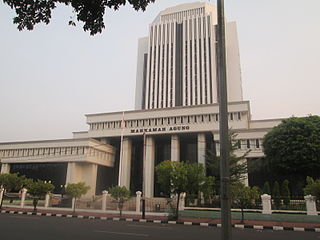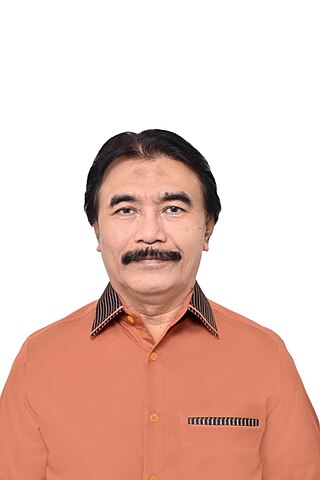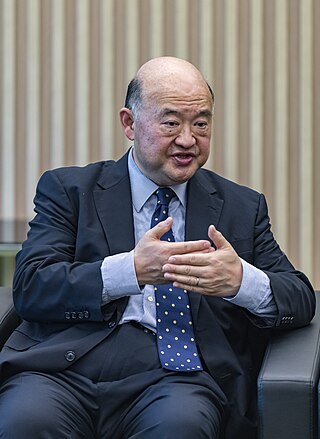
The High Court of the Hong Kong Special Administrative Region is a part of the legal system of Hong Kong. It consists of the Court of Appeal and the Court of First Instance;it deals with criminal and civil cases which have risen beyond the lower courts. It is a superior court of record of unlimited civil and criminal jurisdiction. It was named the Supreme Court before 1997. Though previously named the Supreme Court,this Court has long been the local equivalent to the Senior Courts of England and Wales and has never been vested with the power of final adjudication.
SMU Dedman School of Law,commonly referred to as SMU Law School or Dedman School of Law,is a law school located in Dallas,Texas. Jason P. Nance serves as its current dean.

The Supreme Court of the Republic of Indonesia is the independent judicial arm of the state. It maintains a system of courts and sits above the other courts and is the final court of appeal. It can also re-examine cases if new evidence emerges.

The Judiciary of Indonesia constitutionally consists of the Supreme Court of Indonesia,the Constitutional Court of Indonesia,and the lesser court system under the Supreme Court. These lesser courts are categorically subdivided into the public courts,religious courts,state administrative courts,and military courts.

Dr. H. Adhyaksa Dault,S.H.,M.Si. was the State Minister of Youth for Sports in the United Indonesia Cabinet (2004–2009) of Mandarese descent from Gorontalo. He is also the youngest minister in the clock cabinet which was first announced.

The Constitutional Court of the Republic of Indonesia is one of the apex courts in Indonesia along with the Indonesian Supreme Court. Its primary role is reviewing the constitutionality of Acts (undang-undang). It also has other functions,including resolving disputes over the powers of state institutions,settling disputes over the results of general elections,deciding on the dissolution of political parties,and supervising impeachment. The last two functions have never been exercised by the Court.

The Judicial Commission of Indonesia was established as a consequence of the third amendment to the Constitution of Indonesia ratified by the Indonesian People's Consultative Assembly on 9 November 2001. The Commission's duty is to monitor the performance of judges,advise the House of Representatives on judicial appointments and review community complaints about the behavior and fairness of presiding judges.

Geoffrey Ma Tao-li is a retired Hong Kong judge who served as the 2nd Chief Justice of the Hong Kong Court of Final Appeal—the court of last resort in Hong Kong. Between 2001 and 2010,he held various positions in the High Court of Hong Kong,including Chief Judge,Justice of Appeal,and Judge of the Court of First Instance. Before his judicial career,he was a barrister-at-law in private practice at Temple Chambers,and was qualified to practice in England and Wales,Hong Kong,Australia and Singapore.

Antasari Azhar is a former chairman of the Corruption Eradication Commission of Indonesia. He was fired from his position on 11 October 2009 by President Susilo Bambang Yudhoyono after being convicted of murder. He was granted clemency in early 2017 by President Joko Widodo and released from prison.

The Judicial Service Commission (JSC) of Kenya is an independent Commission established under Article 171 of the Constitution of Kenya. Its mandate as stipulated in Article 172 of the Constitution is to promote and facilitate the independence and accountability of the Judiciary and the efficient,effective and transparent administration of justice. The commission has 11 members with the initial team appointed in December 2010.

Sulaiman Effendi Kusumah Atmaja was an Indonesian judge and national hero who served as the first chief justice of the Supreme Court of Indonesia from August 1945 until August 1952. He was born to a noble ethnic-Sundanese family in Purwakarta,and obtained a law diploma from the Rechtschool in 1913. In 1919,he worked as a court clerk in Bandung,before leaving that job to continue his legal education at Leiden University. After graduating from Leiden in 1922,he returned to the East Indies,and became a judge in Batavia and later Indramayu.
The registrar is a chief executive officer of a judicial forum. They are in charge of the entire registry of the department.

Muhammad Hatta Ali is the thirteenth Chief Justice of the Supreme Court of Indonesia.

The chief justice of the Supreme Court of Indonesia is the head of the Supreme Court of Indonesia.

Anwar Usman is an Indonesian judge and jurist who was the sixth Chief Justice of the Constitutional Court of Indonesia. He was elected to the position on 2 April 2018,replacing Arief Hidayat. He previously served as the fifth Deputy Chief Justice of the Constitutional Court of Indonesia. Usman served on the Constitutional Court for four years prior to his confirmation as Deputy Chief Justice. Before replacing Arsyad Sanusi as a sitting justice on the court in April 2011,Usman was a high court judge in Jakarta,as well as the manager of human resources at the Supreme Court of Indonesia.
The Indonesian Judges Association,known locally as Ikatan Hakim Indonesia or IKAHI is an association of judicial officials in Indonesia. IKAHI's members include first-level trial judges and senior justices,as opposed to the Indonesian Judges' Forum (FDHI) which includes appeals court judges. IKAHI executive Suhadi has described the association's focus as protection of judges from threats and harassment,though judicial transparency activists have disputed this.

Aidul Fitriciada Azhari became chairman of the Judicial Commission of Indonesia in 2016. Azhari has been referred to as a dark horse due to the fact that he initially hadn't been nominated nor had he volunteered to be the Judicial Commission's chairman. Two other candidates were rejected by the People's Representative Council before his confirmation.

Lieutenant General (Ret.) Syarifudin Tippe was a high-ranking Indonesian army general. He was Commander of the Teuku Umar Military Resort from 1999 until 2002,Commander of the Sriwijaya Regional Military Command from 2006 until 2010,and was Rector of the Defence University from 2011 until his retirement in 2012.

Adi Andojo Soetjipto was an Indonesian jurist and lecturer who served as an associate justice of the Supreme Court of Indonesia from 1981 until his retirement in 1997. Soetjipto was nominated twice for the position by the People's Representative Council in 1979 and 1980 and was installed in 1981. He was known for exposing bribery and collusion inside the Supreme Court and his criticism of the Supreme Court.
















